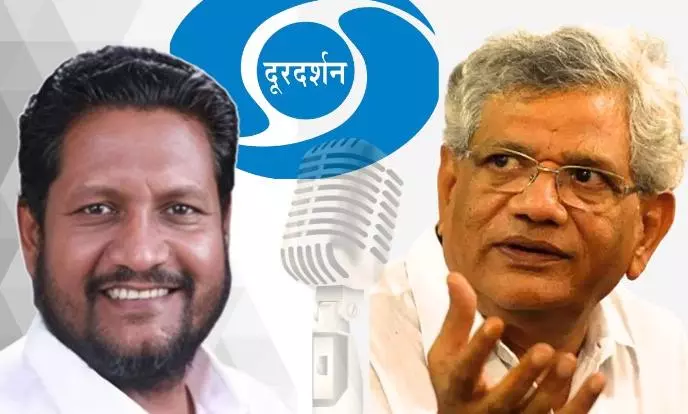
Left leaders prevented from using ‘Muslim’, ‘draconian laws’ in speeches via AIR, Doordarshan
text_fieldsGovernment-owned All India Radio and Doordarshan have reportedly dictated to the Left leaders not to use the words 'Muslims' and 'communal authoritarian regime' in their speeches being broadcast as leaders of national political parties.
CPI(M) general secretary Sitaram Yechury and All India Forward Bloc (AIFB) leader G. Devarajan were instructed to modify these terms, along with others, citing the Election Commission’s directive that no communal or divisive terms shall be broadcast, particularly in the course of the Lok Sabha elections, as reported by The Indian Express.
Yechury, preparing to address the nation through Doordarshan, was mandated to remove terms such as “communal authoritarian regime” and “draconian laws” from his speech. The word “bankruptcy” was to be replaced with “failure” in describing governance.
Despite these alterations being imposed on his English address, the Hindi translation of his speech was accepted without changes, leading to his protest against what he perceived as an arbitrary enforcement of rules.
Simultaneously, Devarajan, scheduled to speak via AIR in Kolkata, was instructed to omit the term “Muslims” from his discourse. This directive came despite his intention to highlight the discriminatory aspects of the Citizenship Amendment Act (CAA) and the National Register of Citizens (NRC) towards Muslims.
Devarajan argued for the necessity of using the specific term to underscore the issue, but was compelled to replace it with the more generic “particular community.”
Prasar Bharati officials defended these actions, citing adherence to the ECI's “conduct rules.” These rules prohibit criticism of other countries, attacks on religions or communities, incitement to violence, contempt of court, and anything that might undermine the unity, sovereignty, or integrity of the nation. They also restrict criticism by name, obscene or defamatory content, and aspersions on the integrity of the President and judiciary.
Under ECI's guidelines issued in early April, national and state parties are allotted broadcast time on Doordarshan and AIR. These guidelines stem from section 39(A) of the Representation of People’s Act, amended in 2003, which ensures equitable time allocation for recognized political parties based on past electoral performance.
The guidelines mandate that national parties receive at least 10 hours of telecasting time on Doordarshan’s national channel and 15 hours on regional Doordarshan Kendras and AIR Stations. State-based parties are allocated a total of 30 hours of regional broadcast time.
The ECI stipulates that written texts of speeches be submitted 3-4 days prior to recording for approval by the relevant authorities. This process aims to ensure compliance with the conduct rules, which intend to maintain a balanced and respectful discourse during the election period.
The enforced changes to Yechury and Devarajan's speeches have sparked a debate on censorship and freedom of expression in India’s democratic process. Yechury contended that these modifications represented a denial of the right to dissent, arguing that his criticisms of the electoral bonds and the governance were legitimate political discourse. He also highlighted the inconsistency in the approval of his Hindi version without the same alterations demanded for the English text.
Devarajan’s case further underscores the tension between regulatory compliance and political messaging. His attempt to call attention to what he views as discriminatory practices in the CAA and NRC was diluted by the enforced removal of specific references to Muslims. This, he argued, weakened his critique of policies that he believes threaten the secular fabric of the nation.























